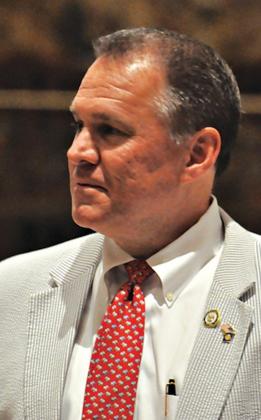
Paul Braun and Drew White / LSU Manship School News Service
It was only one sixth of a penny.
Heading into the final night of the special session Monday, that’s all that divided the House and the Senate over how much of an expiring sales tax to extend.
That extra sixth of a penny would have cost Louisiana residents 17 cents on a $100 purchase. If you shopped for supplies for a high school student, it would have added 67 cents to the average $392 school-year bill and boosted the cost of a $1,299 MacBook Pro by $2.21. For well-off residents, it would have added $69.70 to the $41,000 sticker price of a well-equipped Lexus ES sedan.
It also would have raised $150 million a year that could have been used to avert cuts in TOPS scholarships, health programs and other state services.
The disagreement over whether to extend one-third or one-half of a cent prompted House Republicans to reject a Senate revenue bill as the clock ticked down and led to a wild finish in which neither the Senate nor a House sales tax bill passed, forcing even larger cuts, including a 30 percent reduction in TOPS.
Aided by a Republican, Rep. Julie Stokes of Kenner, House Democrats were trying to get a second vote on the half-cent sale tax increase when Rep. Alan Seabaugh, R-Shreveport, seized the microphone at 11:59 p.m. to keep the vote from happening before the session expired at midnight.
“It’s on you,” Stokes said to Seabaugh, referring to the lawmakers’ failure to produce a revenue bill in the two-week session. “Yes, I’m trying to run the clock out,” Seabaugh said.
Gov. John Bel Edwards, House Democrats and senators from both parties wanted to renew the half a cent to raise $515 million and limit cuts, while House Republicans, who want to cut the size of government, wanted to stick with the third of a cent, raising $365 million. Both chambers also voted to raise $86.6 million through other means.
But even though the $150 million difference in sales tax levels represents only about 1.5 percent of the state’s annual expenditures, analysts say that philosophical and political differences between the parties complicated the debate, as did the fact that tax measures require a two-thirds vote to pass in each chamber.
State agencies were scrambling Tuesday to figure out how much their budgets could be cut. And understanding what happened Monday also is crucial because Edwards plans to call another special session later this month to break a logjam over raising revenue that has gotten worse since he took office in 2016.
“We should be close enough in terms of dollar amounts that we ought to be able to do this,” Barry Erwin, President of the Council for a Better Louisiana, a non-partisan group, said before Monday night’s votes. “If we can’t, I think it’s a real indictment of all of our leaders to come together for the good of the state.”
Erwin said the state has been in the same budget crisis scenario before. The difference this year, he added, is that “a portion of the House has grown more fiscally conservative.”
Edwards essentially echoed Erwin’s comments after the session fell apart, blaming the failure in the House on what he called “that distinct hard core caucus of ‘no’ standing in the way of the state of Louisiana.”
Jan Moller, head of the Louisiana Budget Project, a nonprofit group that monitors how public policy affects Louisiana’s low- to moderate-income families, chided legislators supporting only a one-third tax renewal, or no extension of the sales tax at all, and their “petty politics.”
“It’s not about growing government, it’s about maintaining vital services,” he said.
Jim Richardson, an LSU economics professor, said the difference between the two sales tax levels would cost a family making $25,000 an additional $7 each year. A household income of $50,000 would pay about $23 more a year.
Many Republicans disagree, saying the fight to limit the increase to one-third of a cent is about principles. Some say state government needs to become more efficient. They also argue that keeping the taxes as low as possible could spark economic growth and eventually boost state tax collections.
“I continue to defend the taxpayers against a tax and spend agenda which aims to grow the size of government,” said Rep. Blake Miguez, R-Erath, in a tweet Monday. “State government should be more focused on the economic growth of the private sector, which ultimately funds the state treasury.”
The two-thirds rule means that any revenue-raising measure required 70 votes in the House, which has 61 Republicans, 41 Democrats and three Independents. It is difficult to get that many votes in the House on sales taxes since a number of Republicans have refused to vote for any kind of tax increase and members of the Legislative Black Caucus are wary of sales tax increases. Caucus members argue that the sales tax increase is regressive and overly burdensome on low-income constituents.
Edwards, the only Democratic governor in the Deep South, faces re-election next year, and that also is influencing the politics over the revenue bills.
“We don’t want a Democrat to get re-elected, and we don’t want to give him a political win by doing tax reform — that was something that was told to me,” Rep. Barry Ivey, R-Central, said in an earlier special session that collapsed in March.
